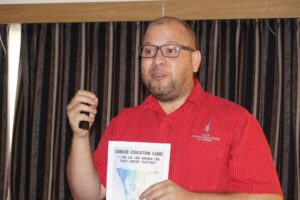
By:Daniel Ndumba
The Cancer Association of Namibia (CAN) Chief Executive Officer, Rolf Hansen has expressed his concern over what they have observed as a low number of Namibians on the global bone marrow registry.
During an interview with The Villager, Hansen said that the contributing factor to a low number of Namibians on the global bone marrow registry is due to the misunderstanding, and poor education that is still out there regarding bone marrow.
The global bone marrow registry helps connect patients with lifesaving donors.
Hansen says that people still do not know how to test for it (bone marrow) and that people do not know as to how they can become donors.
“Cancer still seems to be a stigmatised disease across Africa and this is no different to Namibia,” he said.
The association has a programme that is anticipated to be launched early in April this year, to focus on educating, and testing for possible donors with regards to bone marrow transplant.
The cancer association has partnered with a South African bone marrow registry to help open a bone marrow registry in Namibia.
“What we have done now is that we do not want to reinvent but we rather want to partner with the South African bone marrow registry as well as the international bone marrow registry to open up a Namibian chapter within the already established programmes and registries” Rolf said.
The aim of this is for them to register more Namibian donors at an affordable price, compared to how much people used to pay when registering with the South African registry or any other international registry.
Rolf says Namibia does not really have bone marrow transplant, and everything else related to it is done in parts of Cape Town as well as some parts of Tswane in South Africa.
“Generally, if we have a kid or an adult that needs a bone marrow transplant, they will travel down to South Africa and the bone marrow transplant will then be conducted there” he added.
He explained that much that is related to bone marrow transplants does not happen in Namibia, simply because not so many Namibians are on the donor registry.
“As we see more and more donors in Namibia and the need is greater we will be able to establish a centre of excellence and this sort of treatment will be available here,” he explained.









Comments